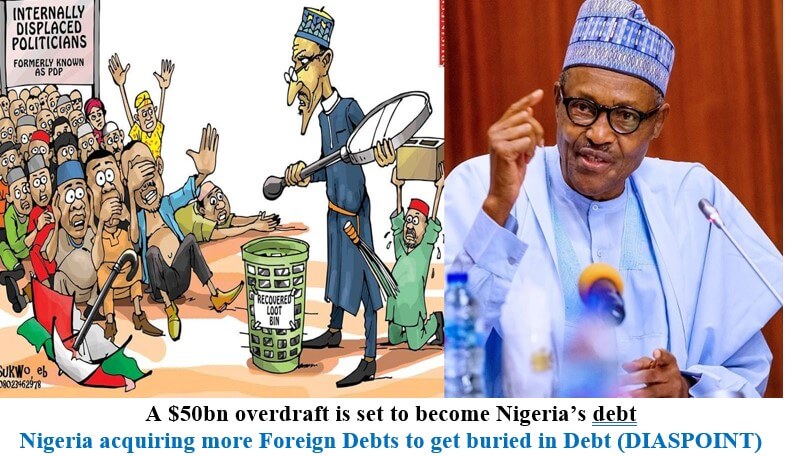A $50bn overdraft is set to become Nigeria’s debt
Nigerian President Muhammadu Buhari is pushing lawmakers to let him add an unpaid $50.4-billion (R862-billion) overdraft from the central bank to the country’s public debt pile despite concerns about the legality of the borrowing.
The outgoing head of state has asked the Senate to approve his plan to convert 22.7 trillion naira ($50.4-billion) in advances from the Central Bank of Nigeria into bonds that will be repayable over decades. The move would immediately boost the country’s official debt load by more than half, propelling Nigeria’s debt-to-GDP ratio toward the 40% limit set by the administration.
The International Monetary Fund and World Bank already include the central bank loans in their calculations of Nigeria’s debt stock. The overdraft is more than the total debt of Ghana or Bahrain, and more than twice that of Tunisia or Iceland.
The matter is near the top of the agenda as Senators resumed work on 17 January, almost three weeks after the upper chamber suspended a rowdy emergency session to consider the president’s request.
Spokespeople for Buhari and the CBN didn’t respond to requests for comment.
The central bank can provide temporary financing to the federal government, but Buhari’s administration has disregarded a law restricting outstanding loans to 5% of the previous year’s budget and mandating that the funding be repaid within the same financial year.
Between the president’s arrival in office in May 2015 and last October, the outstanding balance of so-called “ways and means advances” exploded nearly 30-fold from 790-billion naira to 23.8-trillion naira, according to CBN data.
The “federal government’s accumulation” of the loans “violates the law”, said Vahyala Kwaga, senior researcher at BudgIT, a Nigerian civic group that tracks public expenditure. Advances in the past three years exceeded 100% of the government’s revenue during the preceding years.
A spokesman for Finance Minister Zainab Ahmed said the government had to wait for the passage of legislation in December 2021 before it had “the legal basis for formally repaying” the loans “through securitisation”. He didn’t answer a question about whether the overdraft was illegal.
Elections loom
At the inconclusive Senate meeting on 28 December, some lawmakers demanded more information about how the government has spent the money and challenged the legal basis of the financing. Buhari has said their refusal to endorse the plan – which halves the interest rates to 9% and extends the repayment period over 40 years – would cost the government an additional 1.8-trillion naira this year. The country “stands to lose significantly” if the Senate declines the president’s proposal, the finance minister’s spokesman said.







